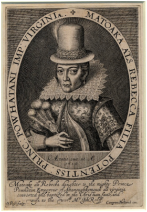 Simon van de Passe - National Portrait Gallery, London. Created December 31, 1615. Simon van de Passe - National Portrait Gallery, London. Created December 31, 1615. The name Pocahontas is widely known in American homes, but the woman behind the name still remains much of a mystery. Who was she? What is myth and what is truth? What we know is limited, but one thing is clear; Pocahontas made an impact that is still discussed and debated 400 years later. Born around 1595, Pocahontas was the daughter of Powhatan, the chief of 30 Algonquian speaking groups in Virginia. The groups were known as Tsenacommacah. Pocahontas is thought to have been around 11 years old when the English colonists settled in Jamestown. Saving the Settlers Though many specific details of her life are unclear, multiple records, oral histories and accounts point to one commonality: Pocahontas tremendously helped the settlers early on in their stay. She visited the Jamestown colony every four to five days with food, which on multiple accounts saved the settlers from starvation. Many records also discuss the relationship between Pocahontas and her father. She was thought to be her father’s favorite and, therefore, significant. This is why many believe Pocahontas is often referred to, and misunderstood to have been, a “princess.” However, Pocahontas did more than deliver the settlers from starvation. Her influence and the relationships she built with the foreign English settlers also contributed to the safety of her own Powhatan kinsmen. For example, Pocahontas reportedly negotiated the release of Powhatans whom the settlers captured. John Smith and Pocahontas Despite popular folklore and fairy tales, no strong evidence exists that John Smith and Pocahontas were romantically entangled. However, their stories are intertwined in both myth and reality. As the story goes, Smith was captured by the Powhatan warrior, Opchanacanough. Smith was brought in front of Chief Powhatan to be executed, or at least this is what Smith believed. In a letter to Queen Anne in 1616, Smith wrote "[Pocahontas] hazarded the beating out of her own brains to save mine; and not only that, but so prevailed with her father, that I was safely conducted to Jamestown." It should be noted that this story is revised and inconsistent from Smith’s original writings in 1608, which don’t mention meeting Pocahontas until months later at a feast. Other historians believe Smith may have embellished the story in his letter, or perhaps even misunderstood that the entire incident could have been a part of a tribal tradition. As time went on, the relationship between the Powhatan and the colonists started to decline as the settlers’ demands grew for both food and weapons. Pocahontas stopped visiting the Jamestown settlement for some time, but her story and connection to the colonists did not end here. Personal Life and Capture In 1610, Pocahontas married Kocoum, a Powhatan warrior. Some believe this may have been a union of love because Kocoum’s status was much lower than one might expect for Chief Powhatan’s daughter. Little is known of this relationship because Pocahontas was captured shortly afterwards by Captain Samuel Argall. Captain Argall believed Pocahontas’ influence, reputation and what we would now consider “political weight” could give him a bargaining chip in dealing with the ongoing and volatile negotiations with the Powhatans. Life in Captivity During her year of captivity Pocahontas was instructed in Christianity and, after her baptism, even renamed Rebecca. While still a prisoner, Pocahontas was permitted to speak with her father for diplomatic reasons. English sources report that during these discussions, Pocahontas expressed her desire to remain English. This is just one of the many Pocahontas related events and discussions still heavily debated. Also during her captivity, Pocahontas met her future husband, John Rolfe. Some historians believe Rolfe’s proposal was a large factor in the negotiation of Pocahontas’ release. He reportedly loved Pocahontas, but her feelings toward him remain a mystery. Later Years Whether the matrimony between Rolfe and Pocahontas was desired by both parties or only one did not seem to matter with regard to the message it sent. For a while at least, their union reportedly re-established harmony between the settlers and Powhatan. In 1615, Pocahontas gave birth to Thomas Rolfe and a year later the family went to England. The Virginia Company made Pocahontas into a symbol of religious conversion. A couple years later, on a ship back to Virginia, Pocahontas fell ill and died. Disney and Dishonesty? When Disney released Pocahontas, The Powhatan Renape Nation vehemently disagreed with claims that the film was “responsible, accurate and respectful.” Chief Roy Crazy Horse of the Powhatan Nation wrote, "It is unfortunate that this sad story, which EuroAmericans should find embarrassing, Disney makes ‘entertainment’ and perpetuates a dishonest and self-serving myth, at the expense of the Powhatan Nation.” Aftermath Pocahontas, like all men and women, had layers and there were surely many layers in her story. The young woman made such a strong mark on the world that her presence, though only 21 years short, is still considered important. In fact, she’s considered so important that nearly half a millennium later debate and discussions around her importance, impact and the meaning of the events, which she may or may not have actually been a part of, continue to be hotly contested. Pocahontas: a Lasting Legacy or an Evolving One? Each of us must decide for ourselves what we believe and who we want Pocahontas to be. She entered the history books because she was kind, caring and shared with strangers. How she continues to live in our ever-evolving history is left to the present generation. By Lisa Zimmermann |
Archives
July 2017
Categories
All
|
 RSS Feed
RSS Feed